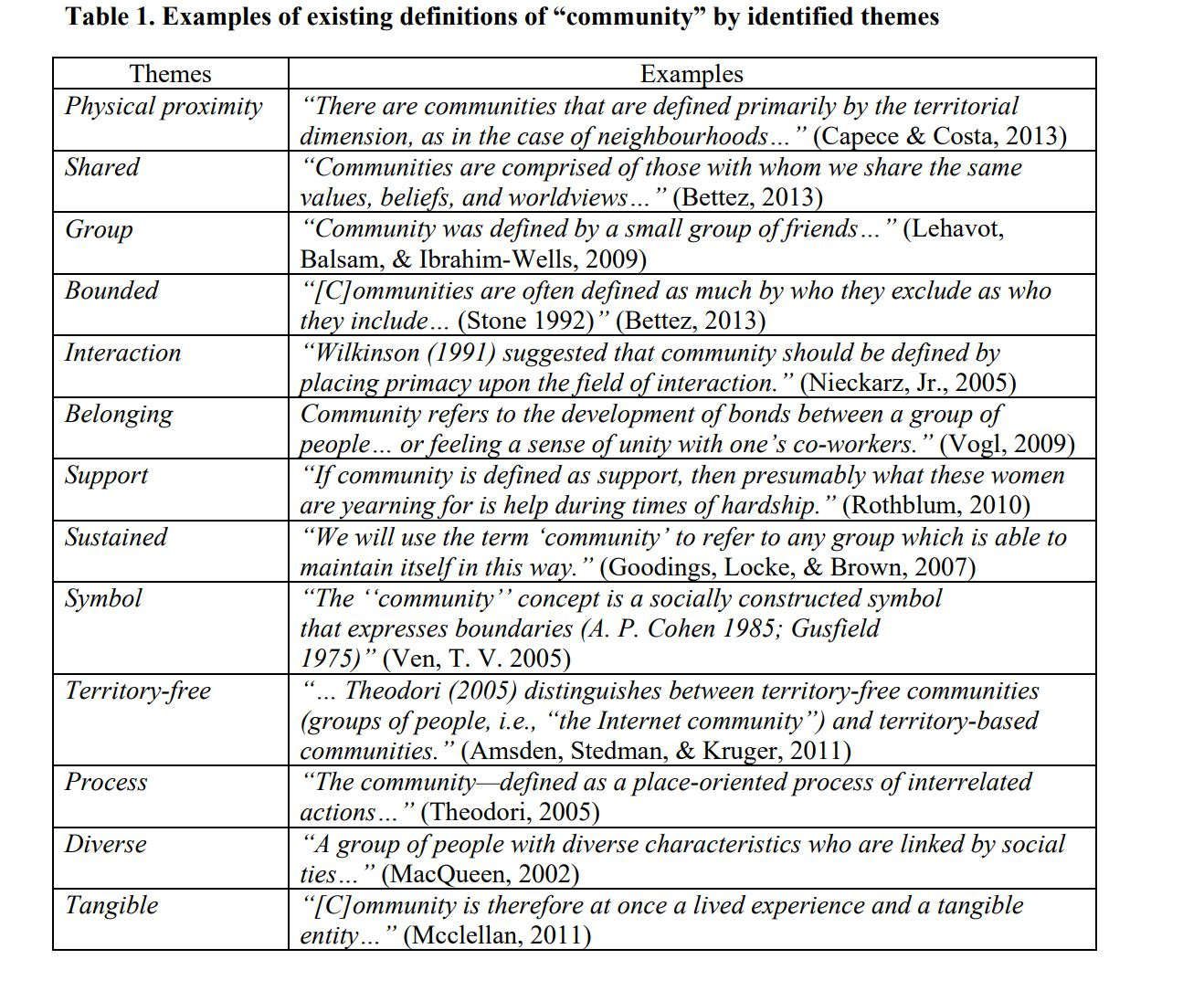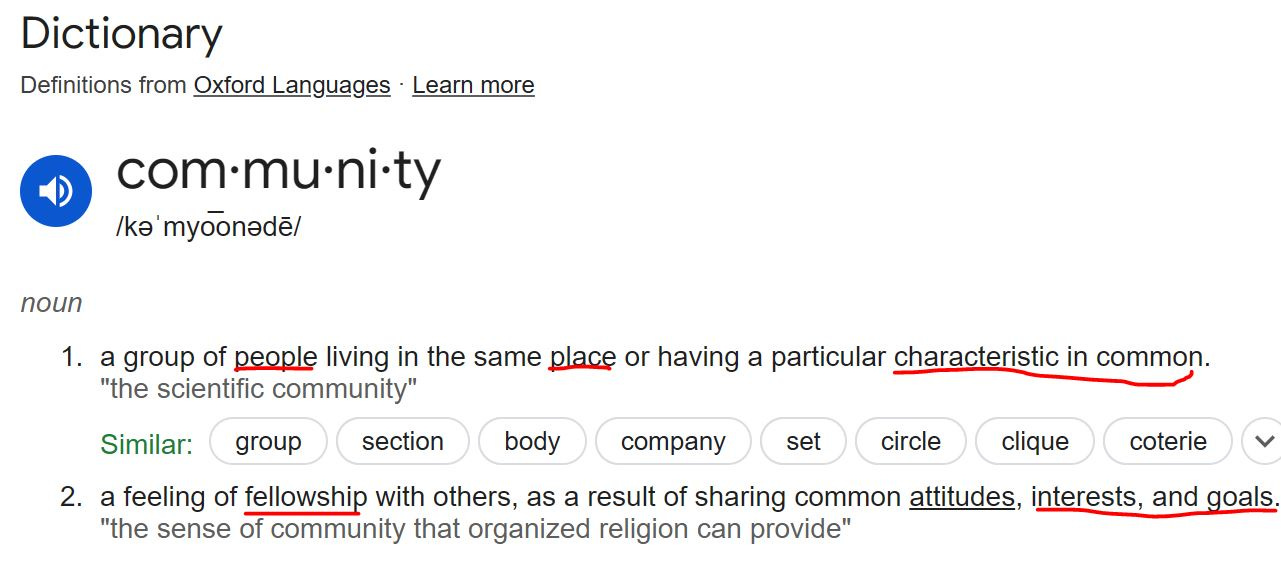Part 1:Examining Community in Nigeria
4 part series exploring who, what and why of community in Nigeria as a missing link to progress in the country

The word "community" has appeared frequently in my writing and on my podcast, so I wanted to take some time to explore its meaning in the context of Nigeria. I aim to examine how community has shaped us in the past and how it could influence our future.
What is Community?
To me ‘community’ is a group of people who exist within a space (virtual or in person) with shared values and who are constantly working towards a set of goals or achievements (tangible or intangible).
But let’s see what other people think.
In his book 'The Philosophy Of Society’ Murphy(1978) defined a community as not just any group that influences the behaviour of its members but a group whose members are related in a quite distinctive way, the way of moral understanding, and the group is a community in so far as they are thus related.

Why is community Important?
Social cohesion: Communities provide a sense of belonging and support for their members, fostering social cohesion within the nation-state.
Cultural preservation: Communities help preserve and transmit cultural traditions, customs, and values, contributing to the nation's cultural diversity.
Economic development: Communities can drive economic growth through local businesses, entrepreneurship, and community-based initiatives.
Political participation: Communities can play a vital role in political processes by organizing, advocating, and influencing policy decisions.
Governance: Communities can enhance governance by providing feedback, participating in decision-making, and ensuring accountability.
Resilience: Communities can be more resilient to challenges, such as disasters or economic downturns, by working together and supporting one another.
In essence, communities are the building blocks of nation-states. They provide essential social, cultural, economic, and political functions, contributing to the overall well-being and strength of the nation.
My hypothesis is that the erosion of real community across Nigeria has led people to become more self-centered and detached from thier environment and this isolation and detachment has robbed nigerians of a chance to develop from the bottom up.
Let’s break this down.
Under colonisation, we see firsthand how Africans are the resource hub for imperialism and capitalism and nothing more. We see several policies and rules being made that aim to divide the people (so that they are easy to conquer) so while Western countries have all these tales of communities banding together to bring about revolutions, the same people took knowledge of that and spent a lot of time and energy destroying the foundation of community in places such as what is Nigeria today. All this blame on religious divide and ethnic divide is at its core fragmentation of the community. If community requires: people, place, and purpose, the moment one of them is missing it’s hard to establish any strong sense of community. It’s again why people keep going back to religion and ethnicity as our causation but not enough people question what it is that causes people to why these ties are so strong.
I’d say part of the motivation to keep going back to those sort of community groupings is that we have not taken the time to foster local, regional, or national identities.
When under colonisation and the slave trade people are being aggressively stripped of their identity its only natural to want to hold on to one or two things. I think because people had to battle we had to resort to primal basis of community formation; In group vs out group thinking. When a persons village is being raided and familties broken apart of slaughtered in front of them I imagine it becomes harder to tell who is with you or not. So you look to things such as who looks like you, who speaks the same language as you, who cries out to God to save me like you do. It’s easy for us today in 2024 to say these are shallow and unintelligent ways to group people even in the west people look to for a moral compass the same principles still apply. Again suruviship bias is real and I can see how one can take it to mean something that it is not.
As I said capitalism/imperialsim has further robbed us of the chance to gather based on values or shared goals.
Place is an important pillar of the community. Under capitalism, rich people live in one place and poor people in another, the shared beliefs and values are not based on shared goals or appearances but based on money. Scholars write about place and proximity as a determining factor of community but, how do you explain a society where people live in ‘face me I face you’ builings, the closest of proximity in compound structure, and yet do not trust each other and have varying values?
To me location alone is not enough to create strong ties.
On the other hand, hundreds of students from across the country, representing varying socioeconomic backgrounds, can join a secondary boarding school in southern Nigeria and create a community. I look back on my own time in boarding school and recognize how extended periods spent with others, shared values (such as reciting the school anthem and pledge daily), shared knowledge (through the same or similar subject content), school uniforms (which level the playing field), shared experiences (like sports lessons and extracurricular activities), and working towards a common goal (finishing each school year with good grades and advancing to the next class) all contribute to helping us empathize with one another and find value in each other.
On that note, communities are more likely to form among individuals with commonalities. For example, regardless of where you come from in Nigeria, you are likely to have shared experiences through schooling (as there are a limited number of schools attended by the upper-middle-class Nigerians), extracurricular activities, and access to technology and media. These are factors that many lower-middle-class Nigerians cannot access, which hinders their ability to relate and share ideologies or experiences.
As I write this, we are in the midst of Art Month, with fashion weeks, art weeks, film festivals, and design festivals taking place across the country. One of the markers of class is often one’s ability to appreciate the arts. The upper-middle class gathers in various parts of the country, spending their weekends mingling, attending workshops, and enjoying artistic events. Meanwhile, their lower-middle-class counterparts are more likely to spend the weekend at vigils or working overtime to afford food for their families for the upcoming week. In my view, this highlights a stark contrast in experiences.
This is not to say say that one type of community is less than or of less value, its more to highlight what the options are when say money plays ahuge contributing factor into who, what, where and how communities are built within the country.
To what extent does income influence our ability to connect with one another? How strong or weak are social ties based on the factors that bring people together? How does gender affect the formation of social bonds? In what ways is technology transforming how people connect and shape communities? Lastly, how does the definition of value impact the quality of those communities?
Tune in next week for the next installment in this four-part series, where I will explore what I’ve learned about community and examine hypotheses around its revival as a pivotal factor in driving changes within the sociopolitical landscape.


